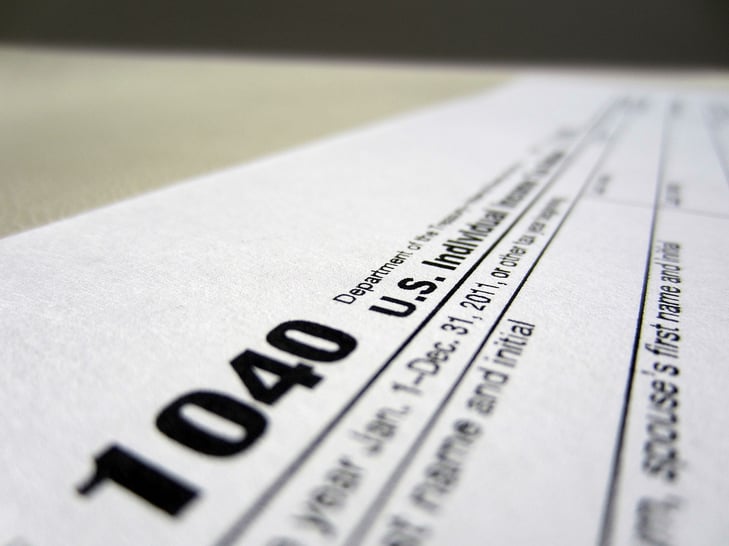We’re almost through March, and you know what that means, seniors: It’s peak tax season! Time’s running out to file your federal, state and local taxes.
For many older Americans — especially those on fixed retirement incomes — this time of year can bring with it significant anxiety about financial security. But there are ways you can save on your obligation to Uncle Sam.
If you're a senior filing your own 2016 taxes, here's what you need to know.
1. If you file a 1040EZ, you might miss out on a credit available only to certain seniors
Many Americans with relatively straightforward income situations and few itemized deductions like to use the IRS Form 1040EZ because it’s streamlined to make filing faster and easier. But seniors who use it might be missing out on some significant tax savings.
You might consider using Form 1040 or 1040A instead. Why?
For one, the Credit for the Elderly or Disabled is only available to seniors filing using a 1040 or 1040A.
You may be able to take this credit if you and/or your spouse are either 65 years or older, or are under age 65 years old and permanently, totally disabled (in other words, receiving SSD or SSDI income).
Tax Day 2017: Tuesday, April 18
If either of those conditions applies, your income on Form 1040 line 38 would need to be less than $17,500 (if you’re single and qualify as above); $20,000 (if you’re married, filing jointly and only one spouse qualifies); $25,000 (if you’re married, filing jointly and both of you qualify); or $12,500 (if you’re married, filing separately and lived apart from your spouse for the entire year).
In addition, there are restrictions on the non-taxable part of your Social Security or other non-taxable pensions, annuities or disability income, so check the IRS’s Schedule R and determine whether you’re eligible.
2. Be careful when you calculate the taxable amount of your Social Security benefits
According to the IRS, miscalculating the taxable amount of Social Security benefits is one of the most common errors seniors make when filing. Check the Social Security worksheet on your Form 1040 or 1040A to determine your taxable amount.
It might help also to review the IRS’s updated Publication 915, which can guide you on what the 2016 obligations are on your benefit income.
3. Some seniors are eligible for higher standard deductions.
If you’re not itemizing your deductions this year, bear in mind that you might be eligible for a higher standard deduction amount if you and/or your spouse are 65 or older.
For 2016, the standard deduction for a single person is $6,300. For a person filing as head of household, the standard deduction is $9,300 and, for married couples filing jointly, the standard deduction is $12,600.
If you’re married and either or both of you are 65 or older or blind, you can add $1,250 to your standard deduction amount. If you’re single or filing head of household, and you’re 65+ or blind, you can add $1,550 to your 2016 standard deduction amount.
See the instructions on Form 1040 or Form 1040A for complete eligibilities and restrictions on your 2016 standard deduction.
4. Take advantage of free tax preparation help
No one’s ever accused the income tax preparation process of being easy. If the various rules and regulations have your head spinning, never fear. Many not-for-profit, civic and advocacy organizations offer free tax preparation help for low-income or otherwise qualifying people.
The AARP Foundation Tax-Aide program, for example, offers free tax prep and filing assistance for low-to moderate-income taxpayers aged 50 and older. Click the link to find which of its more than 5,000 tax preparation locations is closest to you.
There are two IRS-sponsored volunteer tax preparation programs that could help you as well:
- The Volunteer Income Tax Assistance (VITA) program offers free tax help to people who generally make $54,000 or less, people with disabilities and limited English-speaking taxpayers who need assistance in preparing their own tax returns. IRS-certified volunteers provide free basic tax preparation and electronic filing to qualified individuals.
- The Tax Counseling for the Elderly (TCE) program offers free tax help for all taxpayers, particularly those 60 and older. Its volunteer tax preparers specialize in questions about pensions and retirement-related issues. The IRS-certified volunteers who provide tax counseling are often retired individuals associated with non-profit organizations that receive grants from the IRS.
Click here to use the IRS’s locator to find the VITA or TCE tax prep site nearest to you. And remember, due to the 15th falling on a Saturday, the filing deadline this year is Tuesday, April 18. So, seniors, you have a few more days this year than you usually would to file your return.













